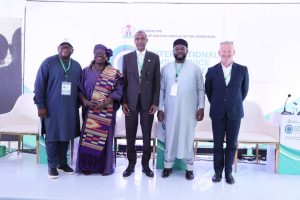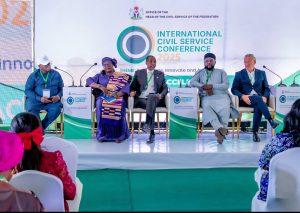NITDA Introduces Digital Competence Framework, Career Model To Retain ICT Talent

In order to curb the rising wave of brain drain affecting Nigeria’s public sector, the National Information Technology Development Agency (NITDA) has introduced a Digital Competence Framework and Career Progression Model aimed at strengthening ICT capacity and retaining skilled professionals within the civil service.
Announcing the initiative, NITDA’s Director General, Kashifu Inuwa, CCIE, said the move is part of broader efforts to make public service roles more attractive and professionally rewarding.
DG NITDA made the statement during the maiden edition of the International Civil Service Conference organised by the Office of the Head of the Civil Service of the Federation in Abuja with the theme “Rejuvenate, Innovate & Accelerate!”, at a session titled “Digital Transformation: Digital Skills for Civil Servants – Capacity Gaps and Future Readiness”.
The Director General of NITDA, represented by Dr. Ahmed Tambawal, Acting Director of the Digital Literacy and Capacity Building Department, explained that the initiative—developed in collaboration with the Office of the Head of the Civil Service of the Federation—aims to tackle the challenge of stagnant roles and the underutilisation of digital talent within government institutions.
“Highly skilled professionals are often stuck in roles that don’t reflect their expertise, while their counterparts in the private sector benefit from clear advancement paths and continuous training,” Inuwa explained.
The framework, already being implemented within NITDA, he said will be extended to other Ministries, Departments, and Agencies (MDAs), adding that it provides structured career pathways and access to globally recognised certifications, enabling civil servants to grow professionally while contributing meaningfully to Nigeria’s digital transformation.
Additionally, NITDA has launched a Digital Champions Programme in partnership with the Office of the Head of Service. The initiative identifies top digital talents across MDAs and equips them with specialised training to lead innovation within their respective organisations.
“These champions will drive digital change from within, promoting efficiency and fostering a culture of innovation across government,” the DG NITDA said.
According to him, the initiatives come at a time when the country is grappling with a mass exodus of skilled professionals—commonly referred to as the “Japa” trend—driven by the pursuit of better career opportunities abroad.
He noted that by creating a more dynamic and rewarding work environment for ICT professionals, NITDA aims to reverse this trend and build a competent, future-ready public service.
“We are committed to developing a digital civil service that retains talent, encourages growth, and drives national development,” Inuwa added.
Other speakers at the session include Permanent Secretary Faruk Yabo Yusuf (lead speaker), Kevin Cunnington and Wumi Oghoetuoma-Jolomi. The discussions were also centred around the rapidly evolving government landscape, driven by the imperative of digital transformation. This involves not only adopting new technologies but fundamentally reimagining how governments operate, interact with citizens, and deliver services. Success hinges on developing key skills within the civil service, robustly assessing capabilities, and making strategic changes to leverage public data effectively for more responsive and personalised outcomes.
PHOTO NEWS

